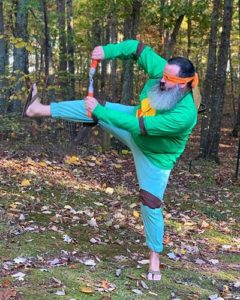The number of different professions that freelancers are engaged in is constantly increasing. We are used to freelance designers, programmers, writers… but not so often to freelance math teachers. And Mike Lane is just that, a math teacher. I had the pleasure to ask him about his life and freelance career.
– Please tell our readers something about you and your interests.
I have two older brothers and a younger sister. We were all born in Texas, but moved around a lot growing up, almost yearly. We put down roots when we moved to Virginia, so I consider that to be home. My mother is from Kentucky; she moved back after my sister graduated high school. My oldest brother lives in Virginia with his wife and kids, my sister lives one town over from mom, and my other brother lives in the same town as mom.
My wife and I live with our son here in Virginia. She is a former teacher and works in the library system in charge of children’s programming and community outreach. I am a full-time virtual teacher. I enjoy listening to audiobooks while driving, building projects with my little monster, and cooking.
– You are a math teacher; did you love math when you were a student?
Fun fact, NO! I was always good at math, but it was one of my least liked subjects, as I did not see much use for it. It is also basically the last subject I thought I would teach, however, in the last seven years of teaching I have come to truly appreciate the subject! One of my main goals is to help students understand the why behind the what. It isn’t enough to just learn the concepts, we need to make sure students understand the importance behind the skills. To help with this I will develop lessons that are real-world based. By real-world, I don’t mean, “Mr. Lane was buying 63 watermelons.” No, instead I strive to build lessons that have real, practical applications. One lesson that comes to mind was when my seventh graders were learning about inequalities. To demonstrate, we spent the day learning about circuit breakers, and how they are a tangible example of how inequalities are used in real life. Almost everyone has experienced overloading a circuit and tripping a breaker, and now my students understand it on a more fundamental level.
Related Posts:
I had various jobs in lots of different places
– How did you decide to become a math teacher?
I will be the first person to tell you that I was a terrible student. I cared more about the social aspects of high school instead of the classes, so I did just enough work to keep my grades eligible for sports. I carried that attitude with me to college, and I was twice asked to leave (very politely, of course). So, I struggled for quite a while. I spent a total of six years in the Army, mostly in the Reserves, although I did do a year of active duty at Fort Lee, Virginia. After that I kind of drifted around. I had various jobs in lots of different places: waiter, bartender, bouncer, logistics coordinator, overhead hoist operator, electrical grunt, QAQC Assistant Superintendent building windmills. I was an insurance salesman, a general manager for a gas station, and an assistant manager for a fast-food restaurant. And I realized, “I’m NOT lovin’ it” (pun intended). It was around that time that I found a college that allowed you to take 99% of your classes online, was nationally accredited, and had killer military benefits. So, I started taking classes, and I finally found a learning environment in which I thrived. I was able to work at my pace, and I am very much a “start the project and get finished” kind of guy, so when the course opened on a Monday, I would go on a bender and finish the class by Saturday. Virtual learning allowed me to obtain my degree (four degrees, actually). The only drawback was even though I had a bachelor’s degree, I did not qualify for a teaching license because I hadn’t had the supervised classroom experience.
So, I started working as a Teaching Assistant, serving K4 exceptional learners. While I was gaining valuable experience, I kept looking for a teaching position. I applied to everything, Language Arts, Math, Science, Physical Education. And a school responded by needing a math teacher! They asked me to prepare a sample lesson, and my interview was literally me teaching a 7th grade math concept (surface area of rectangular prisms) to the principal and the math coach. Turns out, all those years of being a bad student have helped me become a good teacher, because I knew how the students were thinking. The principal sponsored me for a provisional teaching license, without which I would not be where I am today. I am licensed to teach math in seven different states now!
– New technologies have affected all professions, is the job of a teacher changing?
Technology is always changing, and it affects all professions. With teaching, I think there is both a significant PRO and a significant CON that is most profound. The pro is the access we now have. We are able to do more, research more, share and collaborate more. I participated in the Rural Math Innovation Network, which connected rural math teachers all across Virginia. There are so so so many amazing teachers out there I never would have had the honor of meeting but for the ever-changing world of technology.
The biggest CON about technology is the detrimental influence social media has on students, particularly middle school students. These “challenges” kids are doing these days are dangerous. Maybe not physically, but the emotional trauma kids are experiencing, the societal pressure to make poor choices, it is truly disheartening to see.
– You are also a military veteran; can you tell us something about that?
I loved serving my country. Most of my time was in the reserves, and I primarily did paperwork in an S1 shop. My military time really helped me learn my organizational skills and attention to detail.
With Upwork, I am building relationships and collaborations that are paying what I feel my profession is worth
– How did you discover freelancing?
I have been fortunate over the past several years to have the opportunity to work on grant-funded projects in education. These projects allowed me to continue growing professionally, and the side money was very helpful! When the funding ended, however, I was at a loss. How could I supplement my income while still continuing to hone my craft? This led me to frequently searching the internet for side jobs in education. One thing led to another, and I kept seeing a common theme, “Work as a freelancer.” So I started researching. Several articles I read talked about freelancers doing well on Upwork, so I decided to give it a try. It has been an amazing three months! One of the chief complaints you hear from teachers is how the pay isn’t reflective of our professional knowledge. With Upwork, I am building relationships and collaborations that are paying what I feel my profession is worth.
– What is the biggest difference between classroom teaching and online teaching?

For me, the biggest difference is the time. As a classroom teacher I would get to school two or more hours before the students. I was often the first person in the building, and it wasn’t uncommon for me to be the last person to leave. I can remember several times when I wouldn’t leave until well past midnight. With virtual teaching, I am fortunate enough to have found a company that truly believes in self-care. They have entire teams building and perfecting the curriculum, it is the educational version of “plug and play”. I see my family so much more now.
– What are the biggest challenges of online teaching?
Virtual teaching can be lonely. You miss the connections you build with the students, your coworkers, the community.
– What are your success habits?
For teaching – continuous improvement. What we know about how students learn is always changing, so you have to always be willing to adapt your methods. I am a huge fan of productive struggle, pushing your students out of their comfort zones, but still supporting them so they don’t crash.
For freelancing – Daily monitoring. I check the app probably a dozen times a day using the “Best Matches” feature to look for work. If I see something I like, I submit a proposal. If I don’t see anything I like, oh well! There will be something next time!
– What influenced you the most to start freelancing?
My goal is to build a client base that will allow me to cover my monthly expenses from freelancing part time, so that my full time pay can go straight to savings.
Don’t sell yourself short
– What was the best advice you got at the beginning of your freelance career?
Make sure your profile picture shows your character, have patience, and KNOW YOUR WORTH! When I was building my profile, I spent a looooooooong time considering what to put as my hourly rate. I settled on $50/hour based on a project I had recently finished building lesson plans. Each lesson plan took (on average) about five hours, and I was getting paid $250 each, so I figured, why not? So don’t sell yourself short. If you believe your work merits the price, ask for it. Just be certain that you deliver.
– And what’s the worst advice you’ve ever got?
Take any job offered to build a profile. If you are not going to enjoy the work, don’t accept it.
– Have you worked on any freelance platform other than UpWork?
Nope!
– Why has UpWork become your choice?
Honestly, it was the first one I found, but I am having a blast using it so I don’t feel the need to expand my horizons!
– What are the advantages of a freelance lifestyle for you?
Freelancing has given me more freedom and flexibility, a stronger sense of control.
– And what are the disadvantages?
Sometimes a client “feels” fishy. I only submit proposals to jobs that have the “Payment Verified” designator, and I make sure to report any client that tries to break the terms of service, such as trying to work off-platform.
– Are you still teaching, or have you become a full-time freelancer?
I am a full-time teacher and part-time freelancer.
– What was the hardest decision you ever had to make as a freelancer?
When to say no. There are jobs out there that are easy to do, but can quickly become very time consuming. I have had to set boundaries for myself. I like to use the “gas station” standard: If I can earn the same amount of money in the same amount of time working at a gas station then this is not a project I should accept.
I can attribute my success to the experiences and lessons learned from working in the classroom
– To succeed, freelancer must also possess certain soft skills, such as communication, organization, time management … Which soft skills were the most challenging for you?
Thankfully all of the soft skills needed for teaching coincide with the soft skills needed with freelancing, so the transition has not been a struggle for me.
– What has benefited you the most to become a successful freelancer? Your education, certain books, courses, forums, life experience or maybe your military background?
The majority of my freelance work has been centered around educational topics, such as tutoring, assessment creation, and consulting. I can attribute my success to the experiences and lessons learned from working in the classroom, and the opportunities that came with.
– If you could start all over again, what would you do differently in your life?
I would try and do a better job planning and setting goals.
– What is your biggest motivation?
My little monster! I want to make sure I do what I can to take care of him, make sure he is safe and knows his mother and I love him and want the nest for him.
– What do you like most about teaching?
Knowing that I helped someone be a better person.
– How has COVID and lockdown affected your personal and professional life?
I have grown closer to my son, gotten the chance to know him better. Professionally, I truly believe if it were not for the lockdown I would still be in the same school, teaching the same thing, and not doing freelance work. While it has been a horrible time for everyone, there have been some silver linings.
– What is the best way to organize freelance jobs, regular job, and private life?
Scheduling! We don’t have access to good internet, so I have to rent an office in town (for now at least). Juggling my job, my freelance work, my wife’s job, it can be a bit of a struggle. The best advice I can give is get a paper calendar and actually use it. Put it somewhere visible and be sure to update it regularly.
– Several factors are important for success. Can you name some of the most important for you as a teacher and freelancer?
Flexibility – I had a drill sergeant that would say, “The best laid plans go out the window as soon as the first shot goes downrange.” That is something I have always kept in mind. I cannot even begin to tell you how many times I was driving to school and realized a better (sometimes) way to teach something, that I thought would resonate more with my students, so I scrapped the lesson plans I had written and started over. Or even revised and adapted between classes. There are so many factors that influence everything we do, and most of them are out of our control. Just roll with it and do you.
– If you had to single out one characteristic that is most important for the success of a freelancer, what would it be?
Be confident. You are the one who knows you are a professional, so it is your job to show the client why they should pick you. I have one client who decided to interview me because my proposal was, “the only one that sounded like a real person who actually knew what they were talking about.”
– What advice would you give your younger self?
Eat more salads, drink more water, nothing good ever happens after 2am.
– Do you think freelancing will change the way of teaching in the future? Or has the future already begun?
I don’t think freelancing will change the future of teaching.
– The best advice for those who are considering a freelance career.
Don’t give up. I didn’t get a response to my first couple dozen proposals, but I kept trying 🙂





